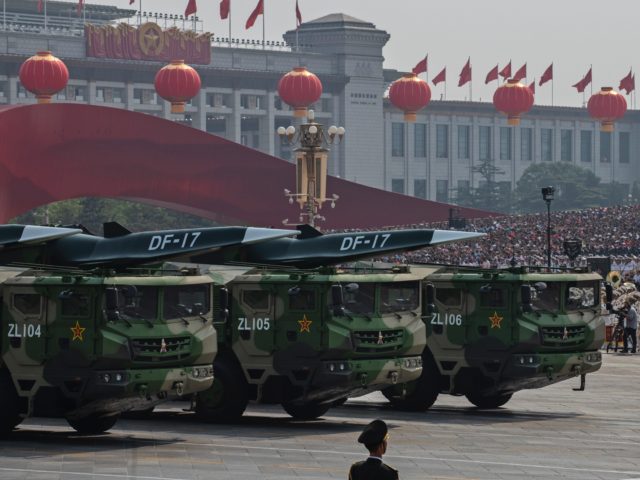Scientists from at least thirty-three universities in the United Kingdom have worked with Chinese military researchers on the development of nuclear weapons, an investigation has claimed.
Top academics, including those at the universities of Cambridge, Edinburgh and Manchester, have reportedly worked alongside researchers at China’s top nuclear weapons research institution, the Chinese Academy of Engineering Physics (CAEP).
According to The Telegraph, academics from at least thirty-three UK universities have published papers alongside Chinese researchers at the CAEP or its subsidiaries. Some of the British scientists are believed to have even accepted positions at the Chinese institution.
The CAEP and its underlings have all been placed on America’s sanction list for their role in developing the communist regime’s nuclear arsenal and advanced weapons technologies. The CAEP and its subsidiaries are also all under the supervision of China’s Central Military Council, which is chaired by Chinese dictator Xi Jinping.
The report went on to claim that the British taxpayer could be in fact funding Beijing’s weapons programmes, as many of the joint projects between the UK and Chinese researchers have taken advantage of UK government grants and taxpayer-funded facilities.
This includes the use of the United Kingdom’s national supercomputer, known as ARCHER, as well as the Diamond Light Source, a £260 million particle accelerator.
The report claimed that academics at Edinburgh University, Queen Mary University of London, and Cambridge University have all been tied to a CAEP laboratory that studies “shock wave and detonation physics”.
The Australian Strategic Policy Institute said that the CAEP’s four main objectives are to “nuclear weapons; research microwaves and lasers for nuclear fusion ignition and directed-energy weapons; study technologies related to conventional weapons; and deepen military-civil fusion.”
The defence think tank went on to claim that the CAEP is looking to expand “its international presence in order to attract leading talent to assist China’s development of nuclear weapons.”
Report: UK Likely Funding Chinese Communist Military Through Joint University Projects https://t.co/Sh74XVN5kf
— Breitbart London (@BreitbartLondon) June 2, 2020
The universities all said that their research was in line with UK law and that the projects were not for military use.
However, former Foreign Office official Charles Parton said: “It is an extremely bad idea to cooperate with an institute that develops nuclear weapons.”
The chair of the House of Commons Foreign Affairs Committee, Tom Tugendhat said: “Some universities’ apparent lack of curiosity about their partners leaves them exposed to accusations of collusion with hostile states, violating human rights, and undermining the security of the UK.
“Clearly they need to realise their responsibility but the Government also has an essential role in making sure they’re aware of the consequences arising from these partnerships.”
British Universities have come under increasing scrutiny for their ties to the Chinese Communist Party, with MI6 reportedly investigating “some of the most prestigious universities in the country” for potentially violating national security laws through their work with Chinese weapons developers.
Some 200 British academics are also reportedly under investigation for allegedly sharing military technology with the communist regime.
REVEALED: Cambridge University and the BBC have become the latest British establishment institutions accused of working in step with China. https://t.co/I2f8lNBwwj
— Breitbart News (@BreitbartNews) February 10, 2021
One of the professors named in the latest investigation as being tied to the CAEP was Prof Simon Redfern, the former head of the Earth Science department at Cambridge University, now based in Singapore.
In 2016, Redfern took a role as a visiting professor with the CAEP subsidiary dubbed “HPSTAR”, going on to publish 15 papers with the Chinese researchers, while he was still serving on two British government science bodies and receiving public funding for his work.
Prof Redfern was also given an award from China’s Thousands Talents plan, a programme which has been tied to the theft of sensitive technologies across the world, most notably in America.
Last year, for example, former Harvard Professor Charles Lieber was indicted for failing to disclose his financial relationship with the Wuhan University of Technology as a part of the Thousand Talents scheme.
The author of a report from Civitas on the ties between British universities and the Chinese state, Radomir Tylecote, described the latest findings as a “major national scandal” and went on to call for the British government to create an American-style sanction list to bar the partnerships from continuing into the future.
Farage: China Launching 'Communist Takeover' as CCP-Linked Firms Buy UK Schools https://t.co/dzEOpXb9Ms
— Breitbart London (@BreitbartLondon) February 21, 2021
Follow Kurt Zindulka on Twitter here @KurtZindulka

COMMENTS
Please let us know if you're having issues with commenting.